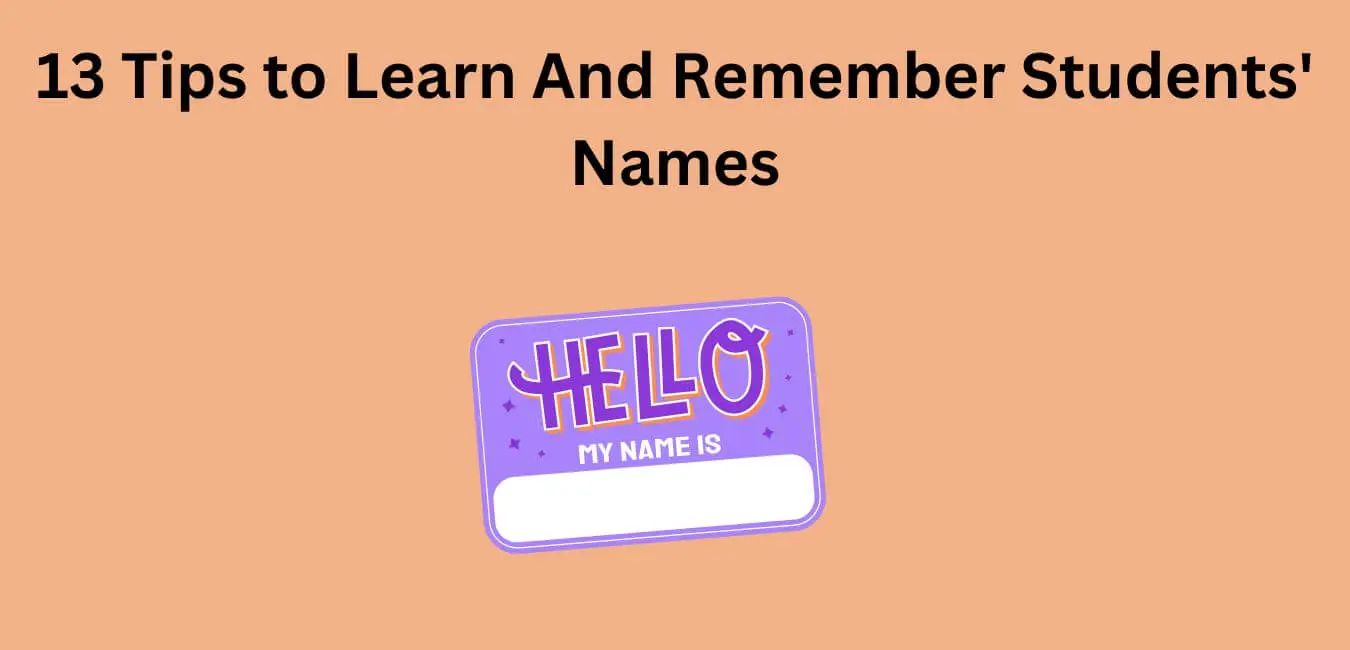Teaching is an extremely rewarding job that comes with many challenges. One of the most difficult situations to manage in a classroom can be students who steal from their classmates. It becomes even more complicated when the stealing student is not only one who trusts you, but also one who likely looks up to you.
In this post, we’ve covered a few ideas for managing behavior in your classroom and creating a safe environment where learning can happen without fear of theft.
How Does Students’ Theft Affect Classroom Management?
Students’ theft can affect the effectiveness of a teacher’s classroom management efforts in several ways. The following are some examples:
1. There is more unsupervised property loss, which increases the risk that students will engage in delinquent behavior and infringe on the teacher’s ability to maintain order.
2. Theft can contribute to underachievement if their motivation for achieving is reduced due to feelings of insecurity and powerlessness in their environment.
3. Theft by students can cause constant tension when the teacher has to focus on patrolling hallways or other areas where stealing occurs.
4. Theft can lead to fear among students that they will be accused of something they did not do, which in turn creates an atmosphere of distrust among them and with the teacher.
5. The physical presence of thieves can monopolize attention, which diminishes the teacher’s ability to monitor more than one student at a time.
6. Theft by students can create feelings of anger and injustice among teachers who cannot afford additional security measures or loss prevention devices, which leads to an increase in stress levels.
7. Theft by students leads to an increase in disciplinary referrals because it causes teachers to focus on the wrong thing, which further distracts them from teaching.
8. Theft can cause distraction and antipathy, which in turn limits their ability to teach.
9. Theft by students can make the teacher’s job more difficult because it causes distraction and antipathy, which in turn limits their ability to teach.
10. Theft can lead to feelings of guilt among students who do not steal.
What Can Cause Students to Steal?
I’ve been a teacher for a long time. I’ve heard many stories about students who steal from other classmates. The following are some 11 reasons why students may steal in the classroom.
1) To get revenge on someone they feel has wronged them in some way.
2) They may think it’s funny or exciting to take something without permission.
3) They may want something they don’t have and feel taking the item will make it easier to get.
4) Many students take what is not theirs as a way of testing their own boundaries; i.e., seeing if they can get away with it, which makes them feel more powerful.
5) To give as a gift or to make someone else jealous.
6) They may feel it’s a good way to impress their friends.
7) To get attention – When kids who struggle with fitting in and often don’t receive much positive reinforcement at home or anywhere else, they may find that stealing is one way of getting high-fives or someone saying “Good job.”
8) They may have a gambling problem or feel that taking something is just part of playing the game.
9) Taking what doesn’t belong to them may be their way of coping with stress.
10) Students are under a great deal of pressure today to perform well in school. They are being pushed at early ages into positions where they’re expected to know more, do more, and create something special. If students are not given the tools to deal with these pressures, they may feel that taking what does not belong to them is one way of coping.
11) Anti-social behavior— Some students who steal do so because they don’t have a sense of right or wrong.
How to Deal with Students Who Steal
Teachers have to deal with students who steal on a daily basis. With so many ways to handle the situation, they are often uncertain of how to go about it. Below are 25 guidelines that will help teachers manage and handle students who steal from their classmates.
1) Get all the facts
Teachers need to gather as much information as they can before dealing with any thefts in class so that they know precisely what happened and who is involved. Being informed will make them better prepared to handle the situation.
2) Talk with those involved
When a theft occurs, teachers should talk to the student(s) involved and see what happened from their perspective first-hand. This can help them identify if there was a misunderstanding or something else that caused the misbehavior.
3) Try to understand why they steal
Teachers need to understand that students will steal for different reasons, including anger, revenge, retaliation, obtaining what they can’t afford, out of habit, etc. This will help them know how best to handle the situation.
4) Let them tell their side
Students might not be willing to admit it at first, but teachers should ask if they had a reason to steal from somebody else. If they did, they should let them explain what happened and why it happened. They have to make sure not to get angry or accuse the student(s) of lying because they might not cooperate otherwise.
5) Discuss alternatives
Teachers need to emphasize with students that stealing from others is wrong but also let them know that there are other ways they can solve their problems. They have to be open to suggestions from the students and a plan of action if they do admit it.
6) Identify the behavior
Teachers need to keep track of any stealing incidents in class and figure out whether it is a chronic problem or something isolated. They must carefully log any incidents so they can see the pattern if there is one.
7) Prevent new thefts
When students are stealing from each other, teachers must look at their classroom environment and ask themselves if it could be contributing in some way to the behavior. If it does, they need to change something about the setting to stop new thefts before they happen.
8) Keep your emotions in check
It’s important for teachers not to let their emotions get the best of them and let students know that they won’t tolerate any stealing. However, they also have to remain calm if they want everybody to take how they’re handling the situation seriously.
9) Make sure it is actually theft
Sometimes, students will accuse others of stealing things, even if they did not do it, to get them in trouble or get back at them. Teachers must make sure that the student(s) actually stole something and not just make false accusations before taking action against any student.
10) Explain the consequences
If a student is caught stealing, teachers need to explain the consequences and why they are happening. They must make sure the student fully understands what they did wrong and how to fix it.
11) Do not accuse
Accusations will often lead to hostility and students might turn against each other instead of cooperating. Teachers need to remain neutral during any investigations into stealing because this makes it easier for students to talk.
12) Don’t make it personal
Teachers must not make the theft about themselves or anything else besides the actual act of stealing itself. Doing this can lead to confrontations that will only worsen what is already happening in class.
13) Use technology responsibly
Technology, like cell phones with cameras, has made it easier for students to catch each other stealing. Teachers can use this to their advantage by giving students permission to take pictures of what is happening during class if they witness somebody else stealing. This is possible if students are allowed to bring phones into the classroom. Else the CCTV cameras in classrooms, if available, can offer great help in identifying the person who stole other students’ items.
14) Avoid calling out
Often, teachers will punish the whole group because one student was caught stealing from them. This should be avoided at all costs because it only hurts the students that had nothing to do with it. Calling out will also create hostility among students that the teacher might have trouble containing.
15) Keep calm outside of class
If a student is caught stealing, teachers need to remain calm and collected when they handle the situation in private. They must not let them know how angry they actually are when speaking to them outside of class.
16) If they don’t confess, it’s not your problem
Even if all the facts point toward somebody stealing something in their classroom, if the student(s) doesn’t admit to it then there is no proof and teachers can’t do anything about it. It’s important for teachers to remember this when it’s happening because they can’t do anything to stop it.
17) Find their motivation
There are several reasons why students might steal from each other, whether it is a lack of belonging, revenge, or boredom. Teachers need to find out what the motivations are so they can come up with a plan to fix the problem and save everybody else in the class.
18) Have clear consequences
Teachers need to have clear consequences for students who are caught stealing so that everybody in the class knows what will happen if they’re caught doing it again. This is important because teachers must quickly follow through on these punishments or their students will learn that they can get away with anything.
19) Avoid calling parents
If calling the parents about stealing is necessary, it should be done in private after class. Calling them into school can lead to confrontations that teachers need to avoid whenever possible.
20) Do not let it get personal
It’s easy for teachers to become angry when students are caught stealing or bullying one another repeatedly. But they have to remember that it’s not about them when dealing with students who are stealing. It’s about getting the problem solved so everybody else in the class can have a safe, fun learning environment.
21) Use empathy to help motivate change
Teachers need to let students know that they understand their perspective and how it might have led them into a particular situation. This can help motivate change and show the students that the teacher cares about them and is willing to find ways to help.
22) Get support
If teachers feel like they don’t know what to do when dealing with thefts, getting help from other teachers or administrators, especially the school’s counselor, might be needed. But it is important to keep in mind that there are times where the person they turn to for advice might have different ideas about how to handle the situation, so it’s smart to fully explore all of their options before making any decisions.
23) Don’t take over students’ responsibilities
Teachers need to avoid taking over students’ responsibilities like paying for stolen goods, especially if they have a history of stealing. This will only reinforce the behavior and make it harder in identifying the root causes.
24) Be patient
Trying to deal with theft can be frustrating and teachers have to remember that there is no quick fix when it comes to changing students’ behaviors. They have to be patient and understanding about the situation, but still, take action when needed.
25) Be consistent
It is important to apply consequences with consistency and not let the student(s) dictate how they are dealt with. Teachers also must make sure that their punishments and consequences fit the crime and don’t let their emotions get in the way of making a reasonable decision. Read more about how to be consistent in the classroom here.
Check out more of our articles here.
Final Thoughts
The purpose of this article is to provide teachers with a list of 25 guidelines they can use when dealing with students who steal from their classmates. From remaining neutral during investigations, calling out the correct student in class, and avoiding confrontations outside of school, these tips are designed to help you maintain your cool when handling stealing incidents. To read more about why students misbehave, click here.



















